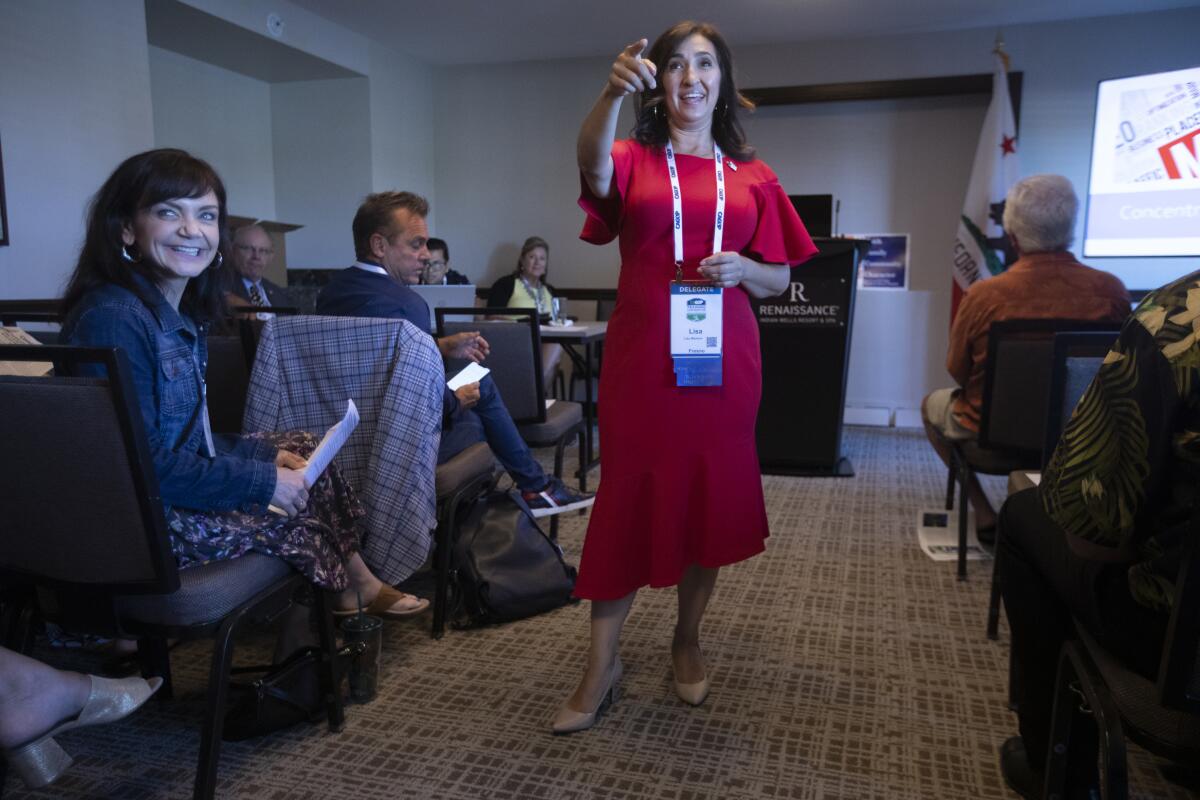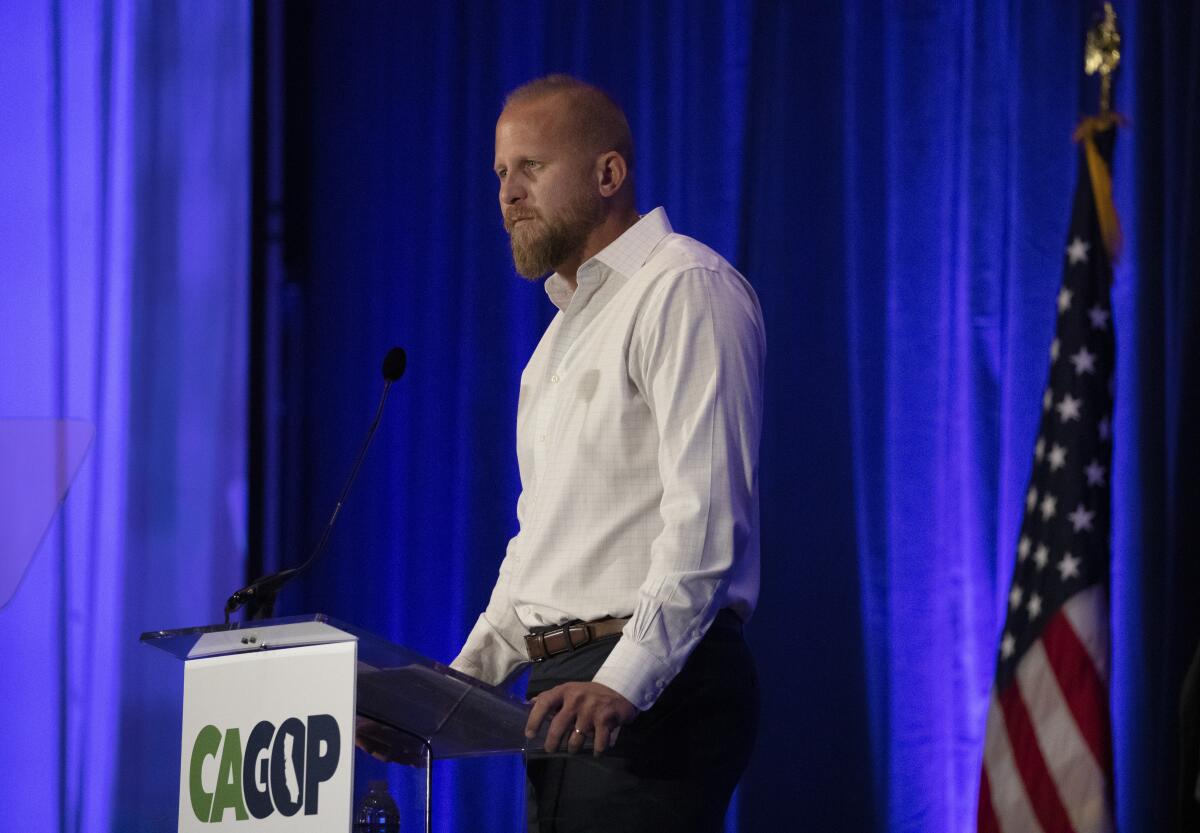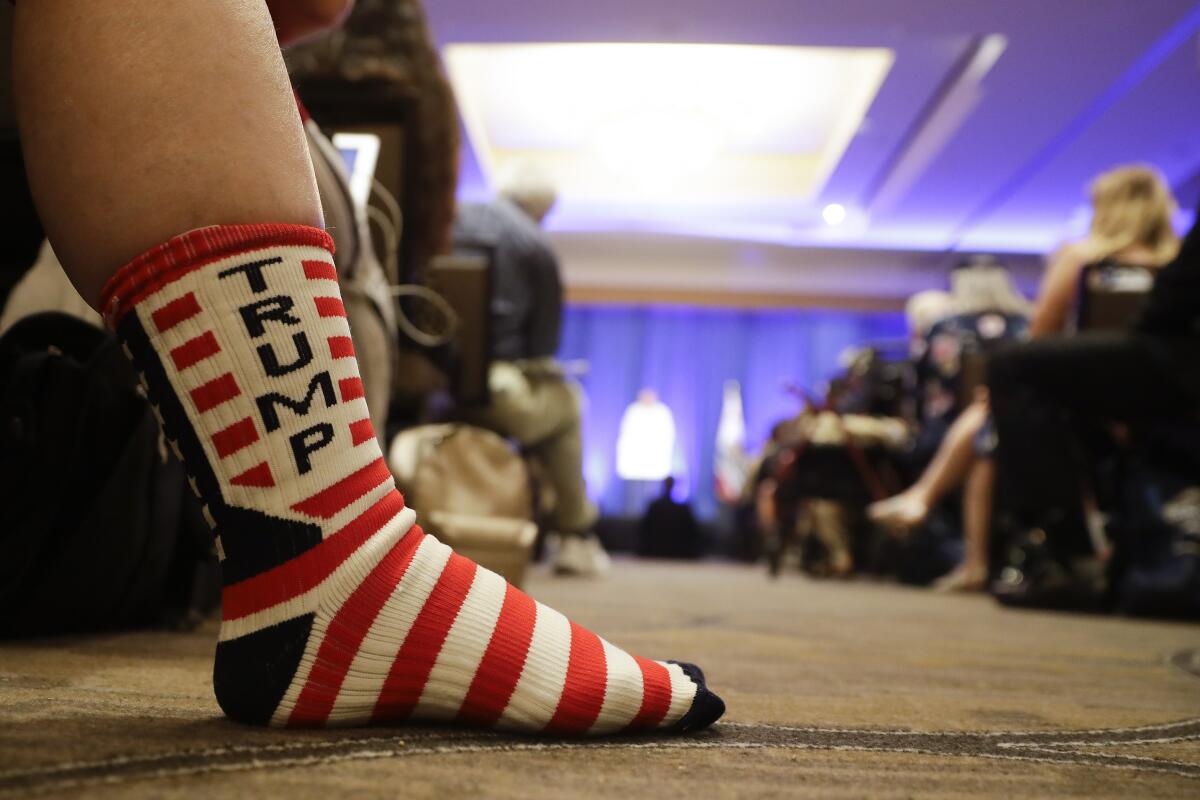Tethered to Trump, California’s GOP hopes for a comeback in a solidly blue state

INDIAN WELLS, Calif. — After crushing losses and a steep slide in voter registration, California Republicans gathered this weekend in the desert, hoping to plot a path back to relevancy in a state where shifting demographics and President Trump’s low approval numbers are continual challenges.
The convention, held at a Coachella Valley resort, featured a schedule that seemed to take a page from the Democrats’ 2018 playbook, with training sessions on registering voters, collecting ballots and engaging Latinos, blacks and millennials — all groups with whom Trump is unpopular. Behind the programming was Jessica Patterson, the first woman to chair the party, a Latina and millennial who promised to make the organization more inclusive and broaden its membership.
But Patterson’s goals could be a tall order for a party whose activist ranks have moved further right in recent years, and predominantly comprise those loyal to the president and his policies.
At a session billed as a training on how to engage “black and urban” voters, panelist Errol Webber said volunteers should point out the value of strong immigration laws to address “the displacement of black people in our communities from illegal aliens who are snapping up all the already scarce affordable housing.” After announcing his intention to run against Rep. Karen Bass (D-Los Angeles), Webber called the congresswoman the “overseer of the black Democrat plantation.”
A few hours later, another group of activists gathered in the same room to discuss engagement in Latino communities, with some suggesting volunteers could hand out sugar skull candies at Mexican Independence Day events to improve outreach. A standing-room-only session on improving GOP efforts to collect ballots from voters, a practice known as “ballot harvesting,” featured speaker Craig Huey, who urged activists to focus their efforts on evangelical Christians while selling copies of his book, “The Deep State: 15 Surprising Dangers You Should Know.”
While those moments provided a glimpse into the party’s strategy to shore up their volunteer base and rebuild infrastructure, most of the weekend’s events were closed to the press, with party staff escorting reporters in for short viewings of a handful of sessions.
The conflicting messages between state GOP officials and members illustrate the delicate balance party leaders must strike as they seek to expand their reach in a solidly blue state while relying on grassroots activists, many of whom are fervent supporters of Trump.
While Trump’s approval ratings have plummeted among many of the groups the state party seeks to court — 90% of African Americans and 70% of Latinos disapprove of the president, according to recent data from the nonpartisan Public Policy Institute of California — his support among Republican base voters in California remains strong.

The weekend’s program included keynote speeches by some of the president’s prominent allies, including Trump campaign manager Brad Parscale, Energy Secretary Rick Perry and former Wisconsin Gov. Scott Walker. The Trump campaign also hosted several trainings at the event on its Trump Victory Leadership Initiative, an effort aimed at recruiting 2 million volunteers nationwide.
The president earned plenty of praise at the convention. Parker Poling, executive director of the National Republican Congressional Committee, called Trump the “best online fundraiser in the history of politics.” In his speech before convention-goers on Saturday, Parscale promised that the Trumps would be a “dynasty that will last for decades.” And Perry heaped praise on his 2016 rival for the Republican nomination for president, saying he had the best political instincts of anyone he’s known.
“We have a president that is willing to stand up and say here’s what I’m going to do,” Perry said to strong applause. “It may make some of you uncomfortable, but this is what this country needs.”
But acclaim for the president didn’t resonate with all in attendance. Longtime GOP consultant and self-proclaimed “never-Trumper” Kevin Spillane joked that he was a “man with no country,” noting the sharp rise in new activists in the state party since 2016.
“These folks are excited and animated by Trump,” Spillane said, adding that while changes in the party have caused more moderate Republicans like himself to step back, he believes new leader Patterson “is doing her job, which as chairman of the California Republican Party is to support the Republican president and reflect the wishes of Republican activists.”
Patterson, who says she hopes to bring a “new message and new messengers” to the state party, said in an interview that her focus remains on regaining the seven U.S. House seats the party lost to Democrats last fall and on taking back a handful of legislative seats that gave them supermajorities in both houses of the Legislature.
She said fundraising has been “off-the-charts positive,” touting a nearly 20% increase in donations from major donors and significant growth in a small-dollar donor program. But she rarely mentioned the president, focusing instead on calling the state’s various ills — including homelessness, poverty and income inequality — “hallmarks of the California Democratic Party.”
Still, the convention, she said, was designed to have “something for everyone.”
“We’re here to excite people in any way that we can get them to help us to turn out the vote,” Patterson said.
In his Saturday speech, Parscale urged delegates to join the GOP’s fight “for the future of this country.”
“The answer is not me, it’s you,” he said. “There’s no money in the world that can do what you can do yourselves. ... You are the ones who will go out and knock the doors, You will be the ones that go out and make the phone calls. We need you to do a lot more for your state.”

He said that Trump’s campaign recognizes the importance of California’s down-ballot races and promised to bring in dozens of campaign staffers in for its election day operation.
Luis Alvarado, a GOP consultant who specializes in Latino voter outreach, said he understands the party’s need to bring in speakers such as Parscale and other Trump surrogates “as a short-term strategy just to get over the 2020 hump” and pump up grassroots activists.
But as long as Trump is president and the state party fails to distinguish itself from its national counterpart, Alvarado added, it will be a tough sell to Latinos and others that they should make a home in the Republican Party.
“It’s very difficult to answer the question, ‘Well, what about Trump?’” said Alvarado, who called Trump’s immigration policies damaging to the party’s brand. “You have to find a way to communicate with people who actually may help you grow the party, and I don’t think there’s a viable avenue to engaging Latinos like there was.”
Los Angeles County activist Anthony Cabassa doesn’t see it that way. At a meeting for the California chapter of the Republican National Hispanic Assembly, a national organization that was started in the 1960s but has been dormant in California for several years, Cabassa and others talked about neighborhood clean-ups and other community events they’ve used to engage with voters in Latino areas.
Cabassa told convention-goers he’s used social media in an attempt to “destroy the narrative” that Latinos naturally belong in the Democratic Party. He pointed out that many Latinos are Christian or Catholic and that appealing to their opposition to abortion could bring them into the fold.
But for his part, Alvarado said he’s felt increasingly sidelined by activists who consider him a “Republican In Name Only” and believes the party has strayed from core issues such as fiscal responsibility and national security that drew him to the GOP.
Still, he shows up.
“I’m here to make a statement that I’m still a Republican,” he said. “I’m going to fight for these values because I think that is necessary to ensure that this party has longevity, somewhere in the future and I hope that this party actually finds a way to grow again.”
More to Read
Sign up for Essential California
The most important California stories and recommendations in your inbox every morning.
You may occasionally receive promotional content from the Los Angeles Times.










